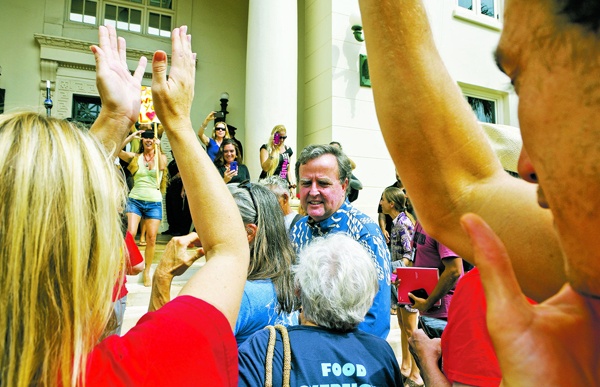LIHUE — For the first time since it passed into law last month, Mayor Bernard Carvalho reported on his administration’s efforts to begin implementing controversial Ordinance 960 (formerly Bill 2491).
“I just want to make clear that there’s a lot of ‘ifs,’” Carvalho told the Kauai County Council Wednesday morning. “This is not one simple process. It’s very lengthy and cumbersome, and a lot of effort has to be put into this.”
Ordinance 960 takes affect in mid-August, giving the administration eight more months to figure out how it will implement the new law.
It requires Kauai’s four biotech seed companies to disclose their use of pesticides and genetically modified crops, as well as establish setbacks around schools, hospitals and other sensitive areas. Kauai Coffee, the country’s largest coffee grower, will also be affected. The law also requires the county to complete and Environmental and Public Health Impact Study of large ag on Kauai.
Although he does not believe the nine-month period is enough time, Carvalho assured the council his administration is moving forward as best it can.
On Dec. 4, the council unanimously approved to allocate $100,000 from the general fund to pay for the first phase of the study, which Carvalho considers the law’s “most important” provision.
As for disclosure and buffer zones, he said they would be implemented once administrative rules are adopted.
“This is very serious, and the administrative rules need to be done correctly,” he said. “In short, this cannot just be done overnight and rushed.”
County Attorney Al Castillo echoed the mayor’s point. When dealing with laws that include criminal penalties — such as Ordinance 960 — he said it is important to have rules in place.
Entities which violate any of the law’s provisions will be assessed a civil fine of up to $25,000 per day, per violation, as well as be charged with a misdemeanor.
Councilman Gary Hooser, who co-introduced the bill along with Councilman Tim Bynum, pointed out that the new law says the county’s Office of Economic Development “may” engage in any rulemaking it deems necessary.
“I know of many ordinances that don’t have rules, or rulemaking processes that have gone for a number of years,” he said. “It’s my understanding that the ordinance, nine months from approval, becomes law, with or without the rules.”
While it would be favorable to have comprehensive rules in place, Hooser said not having them doesn’t stop the law from being implemented.
Bynum stressed that when Ordinance 960 goes into effect, the companies must comply and that the county must be ready to deal with it.
“This discussion about, ‘Well, can we implement this law or not?’ — We will implement it!” he said.
The county said it will continue meeting with various stakeholders through Jan. 30 in order to familiarize them with the process of administrative rule making. A first draft of the rules is expected to be complete by late February.
Carvalho also touched on the Hawaii Department of Agriculture’s “Good Neighbor Program,” which began Dec. 1. He said he was “happy to report” that all the companies — Dow AgroSciences, DuPont Pioneer, Syngenta, BASF and Kauai Coffee — have gone “over and above” the program’s voluntary guidelines by informing adjacent residents of pesticide pre-application plans and hosting small group meetings to introduce the program.
“I know there are objections to this program, that it doesn’t go far, it’s not enough, it’s not happening,” he said. “All I can say is something is in place … This is a step in the right direction.”
Carvalho added that he and the other mayors across the state are scheduled to meet with Gov. Neil Abercrombie on Friday to discuss statewide concerns surrounding pesticides.
Bynum told Carvalho it is important that the state and county continue to move forward on “parallel tracks,” both with the Good Neighbor Program and Ordinance 960.
Councilman Ross Kagawa said he recognized the hard work ahead for Carvalho and his staff.
“It’s going to be a really tough job,” he said.
At several points during the discussion, Council Chair Jay Furfaro reminded everyone that Wednesday was just the first of many updates from the administration about its progress.
“Let’s not turn this into solving all the details,” he said.
As part of the state’s Good Neighbor Program, agricultural companies are expected to submit their first monthly post-application summaries of all restricted use pesticides by Jan. 15.
Ordinance 960 goes into effect Aug. 18.





